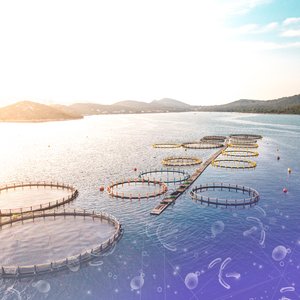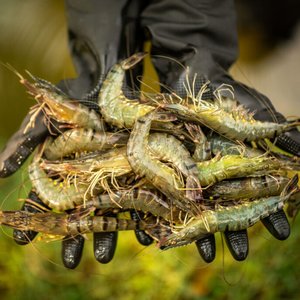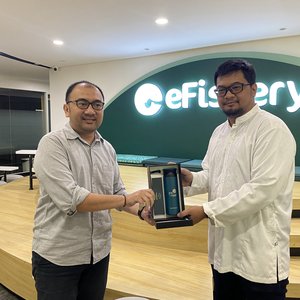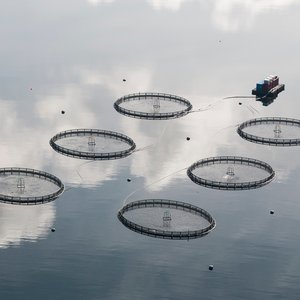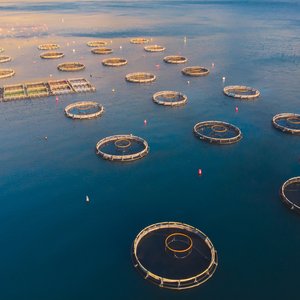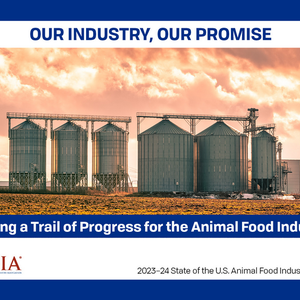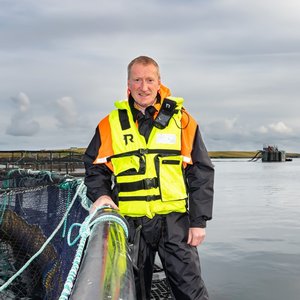To guarantee the sustainability and competitiveness of aquaculture, alternative ingredients must replace fish oils and fishmeal in aquafeed. Substantial efforts to move fish farming in this direction are already underway in the EU. Advanced research initiatives for aquaculture and nutrition (ARRAINA), an EU project led by the French National Institute for Agricultural Research (INRA), will further this work and will allow the long-term effects of this shift on the full fish lifecycle to be measured for the first time.
To satisfy the growing demand for fish that is not dependent on industrial fishing, the European Commission is seeking to develop aquaculture and keep the practice sustainable. In Europe, the main species of farmed fish are still largely fed fishmeal and fish oil derived from industrial fishing. The supply of these products is limited, however, and growing demand is driving prices up. A dependence on these products may threaten the economic and environmental viability of the aquaculture industry.
Launched February 21, 2012 for a period of five years, the ARRAINA project’s main objectives are to:
- create integrated tools to describe and predict physiological responses to alternative ingredients using a set of biomarkers (molecular markers, gene expression, metabolite concentrations, etc.) that are already available or that will be developed over the course of the project;
- develop and verify the use of innovative nutrient delivery vectors such as microparticles, nanocapsules and sonophoresis, for the very early and spawning stages in particular;
- further our understanding of the differing nutritional needs at the various development stages of the five main species (Atlantic salmon, carp, rainbow trout, seabass and seabream);
- measure the long-term effects of alternative ingredients on growth, metabolism and health of these five species throughout their lifecycle, as well as their effect on quality and food safety;
- assess the environmental impact of new ingredients by measuring their effect on feed properties and, for each species, by analysing fecal matter and other fish farm waste while taking various culture systems into account;
- improve the use of alternative aquaculture feeds for mature fish through “nutritional programming” that would allow physiological responses to nutritional stimuli to be permanently altered in the early development stages.
INRA has been involved in several EU projects that have already proven the possibility of drastically reducing the amounts of fish oils and fishmeal in favor of vegetable matter in farmed species’ feed while maintaining the health, well-being and nutritional value of the fish. Feed substitutions may, however, lead to essential nutrient deficiencies or imbalances, or may alter fish metabolism over the course of its lifecycle. Previous work on the subject considered fish lifecycle from juvenile to market ready. The long-term effects of dietary changes to the full fish lifecycle from egg to spawner must be studied in order to determine the type of supplements that may be necessary over the course of a fish’s life.
The ARRAINA program’s ultimate aim is to provide the data, tools and methods necessary to develop alternative feeds that meet the nutritional needs of Europe’s major farmed fish species. To accelerate the process, professional partners from both industry and from SMEs will be involved throughout the project, from definition through to innovation production. Its findings will also allow ingredients to be used flexibly and will constitute a strong foundation for the development of an EU sustainable aquaculture strategy.
The 8 million Euro project is coordinated by INRA Bordeaux-Aquitaine and brings together 21 partners across Europe, including ten research institutes, a feed manufacturer, eight SMEs and a company specialized in knowledge transfer.
Salmon studies
As a member of the ARRAINA project, NIFES will study how salmon can be guaranteed healthy food throughout their life.
Pointing out that what is new about ARRAINA is that the scientists will study nutrition throughout the entire life cycle of the fish, NIFES director of research Gro-Ingunn Hemre said “It will be particularly important to map the nutritional requirements of farmed fish throughout their life cycle. We will also be looking at how feeding in any given generation influences the following generation. Until now, most research has concentrated on shorter phases.
NIFES is responsible for salmon together with University of Stirling. Other Norwegian partners are GIFAS and Biomar.
Until recently, farmed salmon has largely been fed marine raw materials in the form of fish meal and fish oil. However, marine resources will not be sufficient to keep up with the expected rate of growth of the aquaculture industry, so fish feed will need to be based much more on plant-based raw materials in the future, which will change the nutritional composition of the feed. An essential task just now is to determine how this will affect the fish and how we can design new feeds that will provide a nutritious and healthy diet.
The work at Scotland's Stirling University Institute of Aquaculture (IoA) has two major themes and will be conducted by Profs Gordon Bell and Douglas Tocher of the IoA Nutrition group, in collaboration with Dr Herve Migaud of the Reproduction & Genetics group. The first theme involves defining the quantitative nutritional requirements for European farmed fish species to address nutrient input and quality changes arising from alternative diets. Specifically, the IoA programme will address the requirements for dietary phospholipids (PL) in Atlantic salmon juveniles from first feeding until 12 weeks post-smoltification to assess whether changes in PL requirements are required to improve fish growth and health in the juvenile production phase.
The second and larger phase of ARRAINA will investigate the long-term effects of changes in feed formulations on fish metabolism, performance and quality in salmon, over the whole production cycle, and will focus on nutritional requirements for both diploid and triploid salmon from first feeding through to generation of broodstock and their subsequent spawning success.
Project Abstract:
"Sustainable development of European fish farming is dependent on the availability, environmental sustainability of feeds relying less and less on capture fisheries derived fishmeal and fish oil. The European aquaculture industry has made a determined shift towards the use of feeds based on alternative ingredients which continue to ensure the health and welfare of fish and the nutritional value of farmed seafood. However, the long term effects of such interventions and over the full life cycle of the major species farmed in Europe need to be determined.
To answer this challenge, ARRAINA will define and provide complete data on the quantitative nutrient requirements of the five major fish species and develop sustainable alternative aquaculture feeds tailored to the requirements of these species with reduced levels of fish meal and fish oil. By developing innovative vectors to deliver specific nutrients, ARRAINA will increase significantly the performance at all physiological stages thus improving overall efficiency of fish production.
ARRAINA will apply targeted predictive tools to assess the long-term physiological and environmental consequences of these changes in the different species. This will provide flexibility in the use of various ingredients in the formulation of feeds which are cost-efficient, environmentally friendly and which ensure production of seafood of high nutritional value and quality.
ARRAINA will design and deliver new pioneering training courses in fish nutrition to increase research capacities and expertise, particularly in countries of the enlarged EU.
By developing applied tools and solutions of technological interest in collaborations with SMEs, ARRAINA will further strengthen the links between the scientific community and the EU feed industry and will contribute to increase the productivity and performance of the aquaculture sector leading to competitive advantage to the whole sector at a global level."


